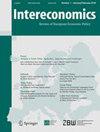欧盟宏观经济失衡程序中的气候变化问题
Q1 Economics, Econometrics and Finance
引用次数: 0
摘要
摘要 欧盟成员国遵守一项维护宏观经济稳定的复杂程序:宏观经济失衡程序 (MIP)。宏观经济失衡程序旨在监测和预防宏观经济失衡,并在必要时加以纠正。它考虑各种变量来确定是否存在失衡,如经常账户余额或单位劳动力成本。然而,气候变化对宏观经济的影响却被忽视了。鉴于气候变化带来的经济风险日益增加,本文认为,宏观经济影响指数应明确考虑与气候相关的风险,以保持其相关性。本文章由计算机程序翻译,如有差异,请以英文原文为准。
Climate Change in the EU’s Macroeconomic Imbalance Procedure
Abstract EU member states observe an elaborate process to preserve macroeconomic stability: the macroeconomic imbalance procedure (MIP). The MIP is supposed to monitor and prevent macroeconomic imbalances – and if necessary, correct them. It considers a variety of variables to determine the existence of imbalances, e.g. the current account balance or unit labour costs. However, the macroeconomic impact of climate change is ignored. In light of the growing economic risks due to climate change, this article argues that the MIP should consider climate-related risks explicitly to maintain relevance.
求助全文
通过发布文献求助,成功后即可免费获取论文全文。
去求助
来源期刊

Intereconomics
Economics, Econometrics and Finance-Economics, Econometrics and Finance (miscellaneous)
CiteScore
5.00
自引率
0.00%
发文量
66
审稿时长
16 weeks
期刊介绍:
Intereconomics publishes papers dealing with economic and social policy issues in Europe respectively in Euroland. The journal consists of the sections editorial, forum and articles. The editorial section contains brief comments on current questions of economic policy in Europe or effecting Europe. In the forum, several authors (researchers, politicians, representatives of trade unions and of employers associations etc.) voice their opinions on one particular current economic policy problem effecting Europe. The articles deal with economic policy issues and trends in Europe. They are mostly written by researchers in economics. Officially cited as: Intereconomics
 求助内容:
求助内容: 应助结果提醒方式:
应助结果提醒方式:


